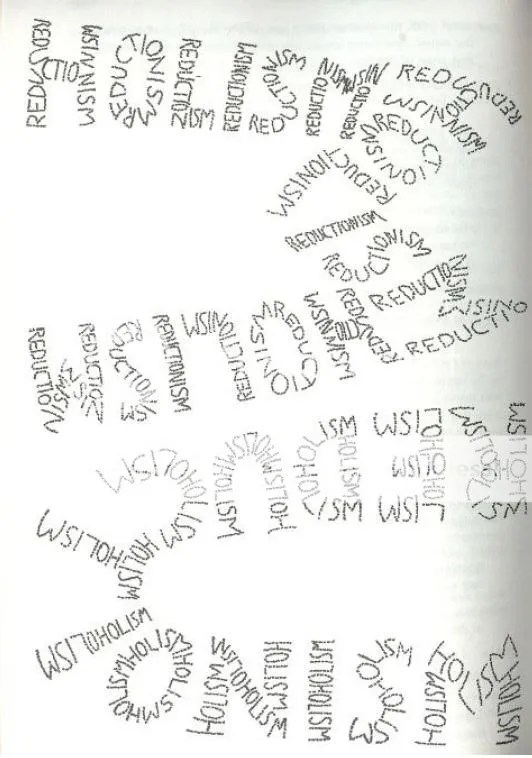
This picture was drawn by Douglas Hofstadter for his classic dialogue “Prelude…Ant fugue” in his masterful Godel, Escher, and Bach. In the dialogue he asked a simple, yet highly illuminating question: what does the picture say?
On the top level, it says “MU”, alluding to the Zen parable of Joshu and the dog. In this parable, a monk asks Joshu “does a dog have Buddhe-nature?” Joshu, with immediate fervor, replies “MU!”, which basically means that Joshu denied the legitimacy of the question. He “unasked” the question. The relevance of the parable is made clear when one attempts to answer the above question: what does the picture say? One cannot simply assert that it says “MU”, although on the top and bottom levels it says as much.(You can’t see it in the above copy, but the individual letters are made out of tiny iterations of “mu”). That would be too simplistic of an answer, although it is trivially “true”.
The beauty of Hofstadter’s diagram is only apparent after you let the meaning of the parable sink in. Do all questions have definite answers? Can we really ask questions like “Is the key approach to the mind reductionist or holist?” and expect simple answers? Is it wiser to instead “unask” such questions? Perhaps that question should be unasked as well!
I love this diagram on multiple levels, which is fitting I think, so I thought I would share it with you all. Please spend the time to ponder on the question of what the picture reallysays, and see if you come to the same conclusion as Joshu.












Perhaps unasking a question is more like denial rather than rejecting the legitimacy of the question. I think it’s like the “Box” chained with chains and locked with locks once opened you cant put the question back in! Would it not be better to progress to find an answer?
There is no answer to the question above, akin to if you see the Buddha on the street what would you do? The correct answer being of course Kill him!
Hi Gary,
I agree that lot of questions need to be “unasked”, but probably to do that one needs to see some wrong assumption behind the question.
For this concrete issue, I guess it depends what one means by ‘holism’. If by holism we mean anti-reductionism, that is, denying that reductionism is giving us the full picture, I would argue for it. But, if by holism we mean denying the primacy of the parts, just to put the whole as an abstract principle, it seems we would again be leaving something out, and I think that Hofstadter’s picture is good in communicating that…
(Well, there is the problem that for specifying the description of that picture, one can just specify the configuration of the letters, which is somewhat reductionistic, but of course that is not Hofstadter’s fault given the limits of the medium)
This post was pointed out to me by a colleague, in response to a similar blog post I just published. I love this self-referential stuff.
Pingback: Jonah Lehrer on Myopic Reductionism | Minds and Brains
Reblogged this on wernerschwartz.